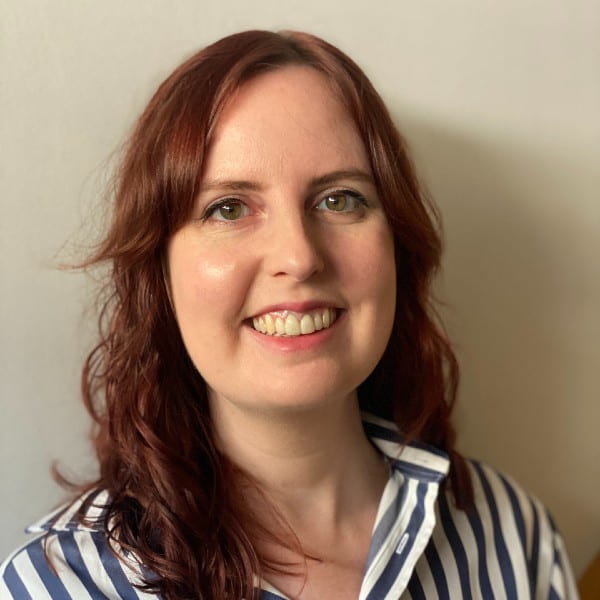Not everyone’s path into academia is straightforward. In this blog, Lara, a Masters alum, and current PhD student describes her journey and what it is like to study alongside a chronic health condition.
About me
My route to postgraduate study was far from linear. I previously undertook contemporary dance training at a conservatoire for my undergraduate degree, then developed the energy-limiting chronic health condition ME soon after graduating. I worked in music industry events marketing for years, which was flexible and mostly manageable health-wise. However, it did not feel fulfilling. I was reading scientific literature on ME and wanted to develop skills to understand and evaluate the quality of evidence.

Lara Hollander
When furloughed during lockdowns, my ME had become mild enough to do an online Access to Higher Education Diploma in Biology and Psychology. This allowed me to see if I could manage my symptoms whilst studying, and to start building skills such as academic writing and critiquing papers. Finding I could pace sufficiently, and having discovered new areas of interest, I sought further study to delve deeper into public health and research.
My journey to MSc Nutrition, Physical Activity and Public Health
Coming across this degree at Bristol, it seemed like a programme that could bring together my interest in health sciences, and love of physical activity as a dancer. I liked the policy focus within the teaching and the MSc welcomed applications from a broad array of subject backgrounds, which I really value. This approach offered the opportunity for new insights and perspectives from my cohort that I would otherwise not have considered.
I thoroughly enjoyed my time on the MSc, in large part due to the enthusiastic and supportive lecturers. I was able to develop academically but also gain experience in various transferable skills. For example, I challenged myself to engage and speak up more in lectures, in an environment where no question was considered too silly! This helped me to improve by ability to verbally articulate my thoughts and in turn increased my self-confidence. These types of skills will be invaluable as I start to present at conferences and disseminate research. I would advise anyone undertaking a postgraduate degree to really engage with as many aspects of it as you can, to get the most out of it.
During my studies I also worked as a fieldworker on a project called Active-6. This experience, combined with exploring my dissertation topic, made me realise that I wanted to do a PhD and focus on researching the physical activity of young people.
Furthering my research
I was awarded ESRC SWDTP funding to continue my MSc dissertation topic of physically active learning in secondary schools, through a PhD (in Health & Wellbeing) at the School for Policy Studies. I am only at the beginning, but it has been wonderful to be so absorbed in a topic I’m passionate about and encounter new creative research methods. I am also enjoying learning about a whole different field – education – since my work is interdisciplinary.
Studying With a Chronic Illness
Studying with a chronic fluctuating health condition has been challenging at times, particularly when there have been deadlines to meet. However, I have been well supported by the University. For example, staff have helped me to explore alternative transport options when I attend campus, meaning I don’t use up my limited energy on walking/public transport which would lessen my capacity for study. Lectures were usually recorded so I could catch up at home if I wasn’t well enough to attend and I received assignment deadline extensions, or extenuating circumstances, when needed. Fortunately, I can keep my symptoms stable by pacing (I acknowledge my ME is mild enough, and I have other privileges such as a supportive partner, to be able to do so). Finding friends at university with similar conditions has provided amazing mutual support; they just ‘get it’ in a way that others might struggle to.
It is a unique juxtaposition, conducting research to increase people’s physical activity whilst having a condition that limits my own physical activity. However, I’ve realised this means I can contribute an important perspective – for example I am aware that certain physical activity interventions may need to be adapted or are not suitable for some groups of people.
For anyone in a comparable situation, I recommend asking for support from disability services/DSA as early as you can before starting your course, not being afraid of asking for what you need, and communicating with lecturers, your tutor or disability services when you need more support. Something key I have found is to never push through when you have a flare up – your health always comes first!
Helping others achieve their goals
I have recently become a Widening Participation Tutor, which involves working towards making university more accessible for young people from underrepresented groups, via workshops and other activities. Studying with ME is the main driver in undertaking this role, as well as my own experiences of being a mature student with little prior academic experience… and plenty of ‘imposter syndrome’!
I understand some of the barriers that might dissuade people from applying for university when, if given the right support, they might flourish and bring vital perspectives to a given field. I am passionate about equitable opportunities for young people, and the importance of increasing diverse representation in higher education.
Follow Lara on LinkedIn to find out more about her research.

